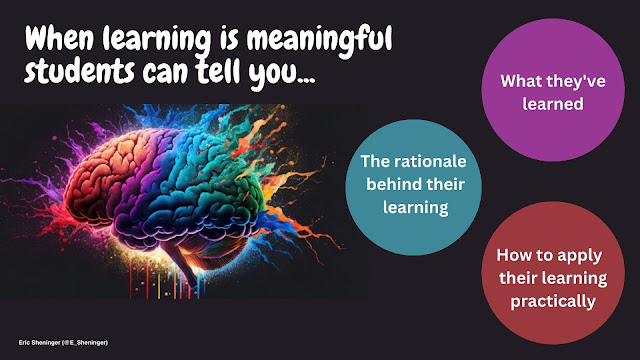Reflecting on my days as a student, I recall how the subject matter was the primary focus in every class. Whether delivered through lectures in college, direct instruction during K-12 education, or occasionally gleaned from textbooks and encyclopedias, it permeated every aspect of learning. Upon closer examination, it becomes evident that information, in the form of content, held a central role in all my classes. The routine was consistent: my peers and I would receive information and then be assigned tasks to showcase our comprehension, occasionally even constructing new knowledge. Essentially, the objective was to excel in exams.
I don't intend to undermine the value of content or curriculum; it serves as the foundation for progressing from basic to advanced learning levels. Indeed, mastering essentials such as letters and numbers is crucial for delving into language arts and mathematics, respectively. However, with the advancement of technology, learners can easily access content and information using various devices as they move through the education system. When considering artificial intelligence (AI), Alexa, Siri, and well-thought-out Internet searches, there is no end to how readily content can be accessed. This prompts the question: How significant is content truly in a knowledge-driven economy evolving rapidly due to technological strides?
Contemporary learners exhibit less compliance and conformity compared to earlier generations, and rightfully so. Whether engaged in authentic or pertinent learning, students naturally seek the underlying purpose and justification, an entirely reasonable sentiment. When content is imbued with purpose and applied in authentic ways to foster fresh insights, learners can articulate:
- What they've learned
- The rationale behind their learning
- The practical application of this knowledge both within and outside of educational contexts
Pertinent and purposeful instruction empowers students to leverage their knowledge to tackle multifaceted real-world challenges, often possessing multiple solutions. This shift in approach is pivotal and represents a move from instruction (what the teacher does) to learning (what the student does). Engaging in learning encourages students not merely to accumulate knowledge but to employ it for practical ends. Many aspire to apply their knowledge to address intricate real-world issues, creating projects, designs, and other tangible outcomes applicable to real-life scenarios. As I shared in Disruptive Thinking in Our Classrooms, the value of content is intrinsically linked to how it's utilized to foster purpose-driven thinking and application, which are both hallmarks of personalized learning.
While being adept at trivia might be advantageous for a game show like Jeopardy, its utility in real life is limited. Given the heightened stakes of today, it's imperative that we critically assess our methods to facilitate growth and enhancement. Nurturing a sense of purpose among our learners is a collective objective that will undeniably yield enduring benefits for their future endeavors.





